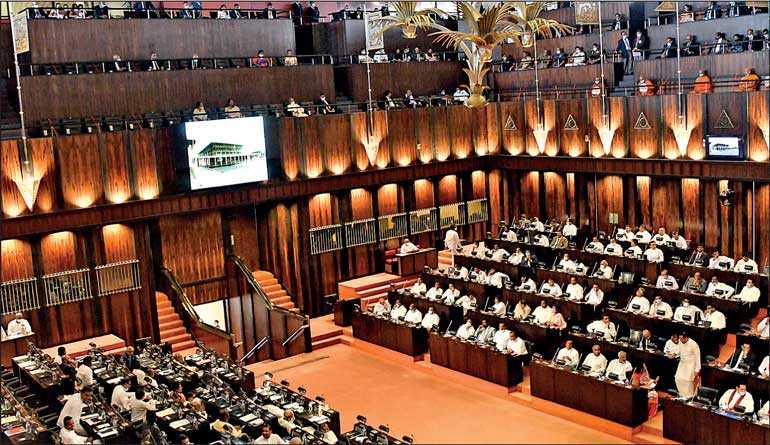Wednesday Feb 18, 2026
Wednesday Feb 18, 2026
Friday, 1 January 2021 00:10 - - {{hitsCtrl.values.hits}}

The standard of Parliament has reached far below the level that a Parliament ought to have maintained – Pic by Shehan Gunasekara
There is an inseparable link between the great collapse of the Sri Lankan State and its system of institutions and the bankruptcy taking place in the country. The collapse of the three major power  centres of the State, particularly the failure of the Parliament or the Legislature to fulfil the responsibilities entrusted with it, at least to a minimum level expected of it, can be considered as the main cause of the great collapse of the State, social order and the economy of Sri Lanka.
centres of the State, particularly the failure of the Parliament or the Legislature to fulfil the responsibilities entrusted with it, at least to a minimum level expected of it, can be considered as the main cause of the great collapse of the State, social order and the economy of Sri Lanka.
The standard of Parliament has reached far below the level that a Parliament ought to have maintained. The Members of Parliament of Sri Lanka are engaged in business transactions with the Government which is contrary to accepted parliamentary traditions and the law of the land; yet they persist on it unhindered and with the patronage and protective cover of the President. Therefore, it can be said that the Parliament has voluntarily surrendered its power to investigate the unlawful practices and functions of the President.
This situation has often led the majority of the Legislature and the President to get together and plunder the public property of the country. Further, this situation has resulted in creating an adverse atmosphere where it would be impossible to maintain rule of law or good administration in almost every aspect of governance thereby plunging the affairs of the country to a level of complete disruption while bankrupting the economy of the country with virtual collapse of the State.
Blinding the eyes
On two special occasions, that is at the 25th anniversary of the Ravaya which was held soon after the ending of the internal Civil War, and again at its 30th anniversary held five years later (November 2016), all the major leaders of the country attended these two special events, an attempt was made to persuade them to initiate structural reforms, explaining the precarious situation the country was facing, but was not to avail.
Several years later, in May 2019, I met Karu Jayasuriya, Speaker of the Parliament, explained to him the ugly situation of Parliament where the MPs are engaged in business transactions with the Government, and requested him to initiate an investigation into the matter. Thereafter, I made the request again in writing by a letter addressed to him, dated 10 May, 2019. He responded to my request, in writing, stating that as the Speaker of the Parliament, he could not do anything as he has no authority on such matters. My impression was that Karu Jayasuriya must be afraid and was hesitant to stand against this situation. Therefore, I sent a letter dated 21 May 2019, addressed to the Auditor General explaining the situation.
Then I lodged a complaint with the Supreme Court with signatures of 62 distinguished persons. It was not a case filed, but only a petition explaining the situation in detail. The Supreme Court had the power to inquire into the matter, if it so wished. But that did not happen. If the Speaker of the Parliament or the Supreme Court had gone to the extent of investigating into the matter, perhaps, it might have saved Sri Lanka from being plunged into a state of bankruptcy.
The collapse of the State of Sri Lanka
The collapse of a State in this manner is not a common phenomenon. It is a very rare situation which can occur only when the leaders of that nation become extremely ignorant. Such a collapse will result only when a major breakdown occurs in all three major power centres of the State (the Legislature, the Executive and the Judiciary) and the economy.
There is a lesson that Sri Lanka could learn from the decline of Roman Empire in 476. Prior to the decline, everything that was happening in Rome had assumed an absurd form as the things happen in Sri Lanka today. The Vomitorium system in Roman mansions followed when hosting a banquet offers the best example that can be cited in this regard.
At their hedonistic banquets, Romans used to eat to the point of vomiting. The food served in a banquet consisted of several courses. The first course included an assortment of four starters prepared with young cow’s udder, sea bream, lobster and mullet and all gulped down with a few glasses of Falernian wine. Before commencing the next course, all the guests attending the banquet should make a visit to the vomitorium – a room adjacent to the dining room replete with basins and feathers to tickle the throat and puke the food taken at the previous course. Then only the next course would begin.
Things that happen in Sri Lanka now, are somewhat similar to certain practices followed by the Roman elites at their banquets. The legendary visit of a king cobra to the Kelaniya temple during the Presidential Election, the COVID syrup produced under the inspiration of the Goddess Kali Mata, the patronage extended by the State to promote it, and the tacit policy of the health authorities on the issue, the baseless policy adopted in regard to COVID deaths causing grievances among the Muslim community, the exploitative policy adopted in importing coconut oil and sugar – all these issues can be considered as examples that reflect the extent to which the sanity has been lost.
The loss of sanity was one of the main causes of the collapse of the Roman Empire which had a devastating impact on Europe keeping it in darkness for over 500 years.